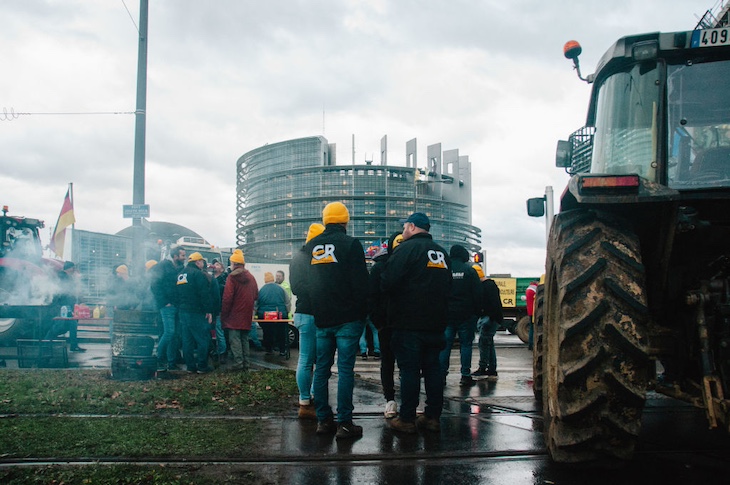Another year, another protest. French farmers are at it again. France’s Coordination Rurale trade union is calling for another round of massive protests starting this week. Unions say that French farmers ‘won’t die in silence’. Cue tractors clogging motorways, hay bales set ablaze in front of government offices, and manure dumped on city streets. This time, the protests are a direct challenge to France’s new government, barely weeks into its term. But let’s be honest: this isn’t really about François Bayrou, the freshly appointed Prime Minister, nor President Emmanuel Macron.
French farmers aren’t just angry about the deal; they’re furious at the impotence of their own government
The French press will dance around the elephant in the room, but the farmers know the truth. This is about Brussels, not Paris. The policies strangling French agriculture – crippling environmental regulations, predatory trade deals, and dwindling subsidies – are made in the European Union’s corridors of power. France, despite its posturing as Europe’s leader, doesn’t have the weight to shape Brussels’s decisions. For French farmers, it’s become painfully clear: their government isn’t calling the shots.
The real power lies with Ursula von der Leyen and her ideological crusade for a greener, more globalised Europe. The sacrifices needed to achieve her grand vision often seem to fall on rural communities. And for French farmers, the latest betrayal comes in the form of the EU-Mercosur trade agreement.
For Brussels, Mercosur is a triumph. The trade pact with South American nations, including Brazil and Argentina, promises reduced tariffs and increased trade. For German industry, it’s a jackpot: cheap raw materials and expanded markets for exports. But for French farmers, it’s a complete catastrophe.
Mercosur means an influx of cheap South American beef, chicken, and soybeans – products from a continent where environmental and labour standards are virtually non-existent. French farmers, burdened by the EU’s stringent environmental rules and animal welfare requirements, are being asked to compete with Brazilian agribusinesses notorious for deforestation and growth hormone-laden cattle. It’s not just unfair – it’s economically suicidal for the farmers who have fed Europe for generations.
This hypocrisy is all being sold under von der Leyen’s so-called Green Deal. Brussels talks a big game about sustainability and climate action, but signs trade deals with nations torching the Amazon rainforest. French farmers are required to reduce their pesticide use, slash emissions, and adopt costly eco-friendly practices, only to see their livelihoods destroyed by imported goods that only give a perfunctory nod to any of these standards.
At the heart of the problem is the EU’s structural imbalance. Germany, and its industrial powerhouse, reaps all the benefits of a deal like Mercosur. Its automakers secure new markets, and its industrial giants thrive. Meanwhile, France pays the price – its farmers thrown under the bus to satisfy Berlin’s demands and Brussels’s obsession with trade liberalisation.
The French government was not even provided with a draft of the EU- Mercosur trade agreement before its signature by the EU Commission in early December. French Agriculture Minister Annie Genevard, along with other EU agriculture ministers, confirmed they had not even seen the contents of the Mercosur agreement that Ursula von der Leyen signed. Faced with growing unrest, the French political class have gone through the motions of protesting to Brussels. President Macron is said to have told von der Leyen that the agreement was ‘unacceptable’ in its current state, suggesting a lack of consultation or prior access to the agreement’s text. The reality is that France can’t do anything about the new trade agreement. Brussels’s smug response is that the EU negotiates and signs trade deals, not national governments.
This dynamic isn’t new, but the political fallout is intensifying. French farmers aren’t just angry about the deal; they’re furious at the impotence of their own government. Last year, during another wave of protests, the government led by Gabriel Attal was able to buy time by making vague promises of reforms and subsidies – promises that were never delivered. The situation for farmers has only gotten worse. This time, there’s no slack left in the rope. The new French government is trying to stall, scheduling negotiations with the farmers starting only in mid-January. Police, meanwhile, have been deploying around the capital to prevent tractors from reaching central Paris.
Emmanuel Macron, for all his talk about protecting French agriculture, hasn’t done much to help. He has long fancied himself as Europe’s dealmaker and a champion of French interests, but that image is increasingly hollow. Farmers see him as little more than a puppet of Brussels, grinning awkwardly at EU summits while von der Leyen dictates the terms.
The truth is Macron has little leverage in the European Commission, where the German-led industrial bloc holds sway. French ministers can promise to stand up for their farmers, but when push comes to shove, they are powerless to change the direction of EU policy.
Enter Marine Le Pen. For years, Le Pen has positioned herself as the voice of rural France, railing against EU policies and the urban elites who enforce them. These protests – tractors rumbling through Paris, manure dumped at government offices – are a gift to her National Rally party. They reinforce her narrative of a France betrayed by Europe and abandoned by its own leaders.
Le Pen doesn’t need to do much. All she has to do is point to the spectacle and say, ‘This is what Brussels and Macron have done to you.’ With a French presidential race on the horizon, these protests are playing directly into her hands, even if you wonder if she’d be willing to take Brussels on if she were president.
The Coordination Rurale has called for a ‘renversement de la table’ – a total overhaul of the system. And who can blame them? French farmers are being crushed by EU environmental regulations on one hand, and trade deals like Mercosur on the other. All the while, the French government offers nothing but empty promises.
As French farmers rage against the machinery of EU bureaucracy, their British counterparts should count their blessings. The next time a convoy of tractors rolls up to Downing Street, farmers should remember this: they’re protesting against a government that actually has the power to make decisions. Westminster might get things wrong – often spectacularly – but at least it’s accountable to voters.
French farmers don’t have that luxury. Their government is just a middleman, powerless to shape the policies that dictate their lives.
Meanwhile, Germany’s industrialists look set to prosper, von der Leyen secures her legacy, and Macron grins awkwardly at another summit. For French farmers, the betrayal is complete. And unless something changes soon, the tractors rolling through Paris will be rolling off into the sunset for good.








Comments